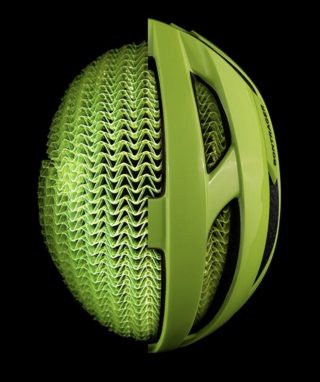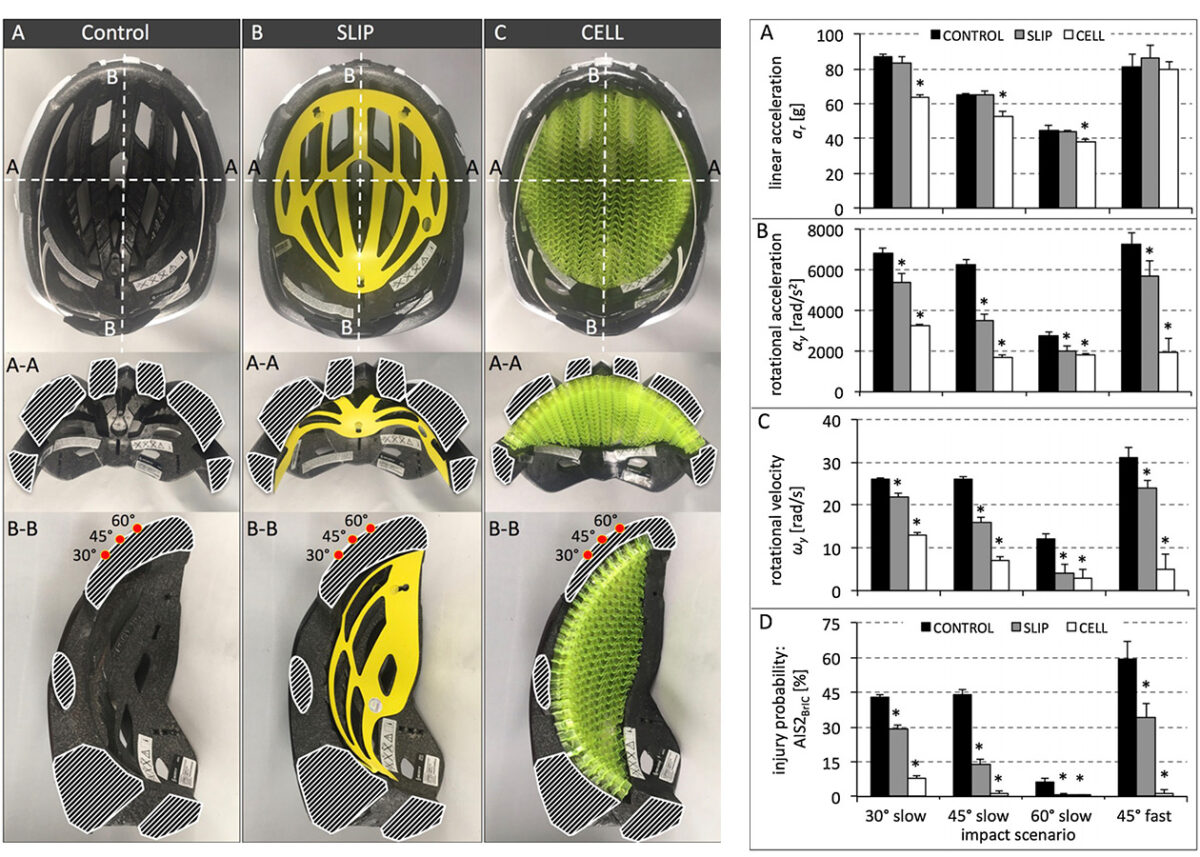
A local company has played a major role in the development of a new helmet released today by Bontrager, a bicycle part and accessory brand owned by Trek Bicycle Corporation.
Bontrager says the WaveCel technology used in their new line of helmets, “disrupts 30 years of accepted safety standards.” The company says research proves WaveCel is up to 48X more effective than common expanded polystyrene (EPS) foam at preventing concussions caused while cycling. The “collapsible cellular material” was developed by Dr. Steve Madey, an orthopedic surgeon, and Dr. Michael Bottlang, a biomechanical engineer. Madey and Bottlang work for Apex Biomedical, a company with a laboratory in Clackamas and an office in downtown Portland. Their research was performed at the Legacy Research Institute in north Portland. Madey and Bottlang worked with Trek and Bontrager’s research and design teams for four years developing the material.
According to Bontrager, “WaveCel is the first advanced helmet technology ever to receive funding from the US National Institute of Health.”
Here’s more about how it works (video below the jump):
“Unlike a standard foam helmet, which is designed to protect against direct impacts, WaveCel accounts for how most cycling accidents actually happen — ungracefully, with twists, turns, and angled impacts. WaveCel absorbs energy in multiple ways. On impact, the layers of the WaveCel material move independently and flex until the cell walls crumple and then glide, actively absorbing direct and rotational energy and redirecting it away from your head. This three-step change in material structure — flex, crumple, glide — is remarkably effective at dispersing the energy from an impact. Nearly 99 times out of 100, WaveCel prevents concussions from common cycling accidents.”
Advertisement

(Images from Accident Analysis and Prevention)
Results of laboratory testing published in Accident Analysis and Prevention (December, 2018) showed significant decrease in the risk of traumatic brain injury in helmets with WaveCel technology when compared to foam and Multi-Directional Impact Protection System (MIPS) helmets. Specifically, the WaveCel material slowed down rotational acceleration and rotational velocity — both of which are correlated with TBI.

WaveCel is exclusive to Bontrager helmets (although I won’t be surprised if it’s licensed to other brands in the future) and is currently available in four models: the XXX WaveCel Road Helmet ($299.99), the Blaze WaveCel MTB Helmet ($299.99), the Specter WaveCel Road Helmet ($149.99), and the Charge WaveCel Commuter Helmet ($149.99).
The helmets are available locally at Bike Gallery.
— Jonathan Maus: (503) 706-8804, @jonathan_maus on Twitter and jonathan@bikeportland.org
Never miss a story. Sign-up for the daily BP Headlines email.
BikePortland needs your support.









Thanks for reading.
BikePortland has served this community with independent community journalism since 2005. We rely on subscriptions from readers like you to survive. Your financial support is vital in keeping this valuable resource alive and well.
Please subscribe today to strengthen and expand our work.
What a flop of the hype machine!
Is this a single use helmet?
well played good sir, well played.
Every helmet should be “used” only once.
That was pretty good and as soon as I hit “post” I knew what kind of response I’d get.
EPS foam was a pre-existing material incorporated into helmets because it worked inside a plastic shell and was much better than nothing.
This new stuff was designed and engineered from the ground up to optimize protection performance in real crashes. I am convinced that “materials science” is real.
It is interesting that the video shows a 2 meter drop test–first I’ve seen.
It is expensive but a lot cheaper than a head injury. I’ll be trying one on this spring.
My current helmet will be three years old next winter, so will be replaced before next spring, so I’ll probably try one of these.
It is great to see a local company involved in this kind of product focusing on the safety of cyclists. Now available locally as well:
https://www.bikegallery.com/products/bontrager-wavecel-pg327.htm
Thanks for that link Kelly. Glad to know BG has them. Will add link to the story.
Just ordered one. Discounted through Bike Gallery (thanks for the link above).
I’m not seeing the discount on the BG website. Is it a code?
MIPS was invented by a neurosurgeon for equestrian use. It’s nice to see medical professionals get involved in this business and even nicer still to have product technology specifically designed for cycling.
We’ve come a long way since tightly rolled bandanas were standard safety gear for a bicycle racer’s head but, if you actually think about it, why did it take this long?
“…why did it take this long?”
Cynical me wants to answer this, but I won’t.
It took awhile because R&D are difficult and expensive for what used to be very small companies. A friend of mine was principal owner of a now-defunct bike helmet company; he pulled the plug when pricing out a realistic head form for testing; it would have cost $250K that he didn’t have and that the relatively tiny 1980’s market for cycling helmets wouldn’t have let him recoup before his retirement! It has not been very long that ANY company in the bike industry could be considered even remotely “big.” When compared to Fortune 500 companies, there are NO fat cats in this industry, repeat, NO fat cats here.
The commuter model says it has “new e-bike technologies”. What does that mean?
I just did a quick comparison of the 4 models, and the commuter model specifies a “Blendr” rear mount for Bontrager light accessories. Also if you look at the shell, it has many fewer vents because you’re presumably not sweating as much.
There’s a huge dearth between helmet models ($150 vs $300) on both lines, I’m going to wait on these until they have all the safety features I require. That said, I like the technology and thank you for publishing the graphs. Marketing really got a hold of those numbers (up to, nearly, etc).
Could you understand why some are $299 and some are $149?
I got on the chat feature on their website and the person I talked to said that it was due to the aerodynamic shape of the more expensive models, and the associated testing and prototyping that goes along with that. I found this to be a dubious explanation but it’s the one I was given. My best takeaway from that is that the “aero” version is more like the “sponsored rider who doesn’t have to pay for their own gear” version and is priced accordingly.
That link to the bike gallery has a 10% off coupon for the rest of March!
What is dubious about this? Looks like some small feature differences in addition to being more aerodynamic (aka larger) without sacrificing much weight. The lower end helmet seems to follow pretty standard existing designs while the higher end helmet is designed for a worldtour pro team. Gaining those seemingly small performance advantages only get more and more costly. Yes, far majority of riders do not need this level of a helmet but that rarely factors into what a cyclist will actually pay for. Good news is they even sell a MIPS helmet under $100 for those not interested in that level of performance.
Like I said, for the rider who doesn’t pay for their own stuff. Good time on you being grouchy and condescending though, let me guess, a roadie.
From some quick and lazy internet research, I think e-bike helmets have to meet some kind of motorbike standards, and are designed for higher speeds. Heavier? More protective? Meaningless difference? I couldn’t tell.
All my helmets are MIPS but even so I took a nice 5 minute nap last summer. Depending on scenario this looks like a much larger improvement from MIPS then even MIPS was from EPS. Currently race in a Bontrager so definitely will be looking at these when upgrading.
Are they 48x more effective at keeping drivers from running into me?
You and I should talk lights and horns. 😀
This is great! I suffered a TBI when I was 18 and have first hand experience. I will most definitely invest in one of these helmets. I did a tour of the Lab with Michael Bottlang a few months back and got to see some of the research out into it. Stoked to see it released!
Hmm… this looks amazingly similar to the Smith Koroyd helmet technology.
R&D = Rip off and duplicate.
https://www.smithoptics.com/us/techbike
They’re superficially similar, but WaveCel is less rigid and only needs to be attached to the edges of the helmet, while Koroyd is fairly rigid and has to be attached to the entire helmet. That allows WaveCel to compress quicker and act as a slip plane. Plus, the pattern is hopefully better for ventilation. Koroyd helmets are bloody awful in that regard.
Ordered one tonight, and just hope it’s small enough for my pinhead. Having had one major TBI (auto crash) and several concussions (bike – I don’t fall competently), I don’t ride without a helmet, but I don’t trust them to be much use. A helmet might be most useful as a signal to drivers that I respect (what’s left of) my brain, but I’m hoping this one will actually deflect forces
I would have said weight plays into it, in that getting the same safety results from less weight (less material) would take more engineering and testing, but the Spectre model at $149 weighs less than the XXX model.
48 times more effective at preventing concussions? It’s well-documented that bicycle helmets have minimal protection from concussion. So, if you start with nothing, and multiply it by 48, what do you get?
Marketing hype.
Because the Spectre has less material in it. The XXX has more material on shell and appears to even be larger overall to improve aerodynamics, weight difference is within 10 grams despite this.
This is a very cool helmet. I ran out to check it out today as I’m in the market for a new helmet and wanted to get one of the MIPS 2.0 (not an official designation, just something I made up) helmets coming to market. The thing that surprised me is that the cheaper one has a nice clasp design while the more expensive one has the traditional helmet strap clasp. I found that odd.
The immediately obvious down side to this material will be that it will trap bugs which will then be difficult to clean out.
Anyone know where I can physically check out the Smith helmet with Koroyd mentioned by Matt earlier in the comments? So far, I’ve been to Universal and Bike Gallery. Thanks
Do the tests determine how many angels can dance on the head of a helmet?
TAKE10 through April 1st.
Does anyone else manufacture a bicycle helmet in Oregon?